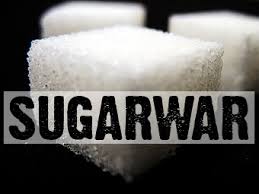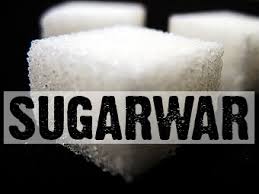
Slowing of growth in global demand, which along with other factors could signal a fundamental shift in consumption ahead, is being caused by the "war on sugar" which is being waged by governments and consumers to combat public health emergencies like diabetes.
According to analyst group Platts Kingsman, consumption may grow at its slowest pace in seven years in 2017/18. nearly half the average growth of about 2 percent per year over the last decade, a rise of 1.04 percent was forecast by it.
"Consumption is generally stagnating in developed countries," Tom McNeill, director at commodity analyst group Green Pool, said.
the use of alternatives like high-fructose corn syrup in developing countries that might otherwise have made up the shortfall and higher prices have exacerbated the falling consumption in more health-conscious markets.
According to Tropical Research Services, this could represent a "step-change lower" - or a fundamental shift - in global consumption, combined with weaker demand from food and beverage makers globally.
"So, it may be that the real long-term 'trend' rate of global sugar demand growth has changed and is now lower," the group said in a May 7 report.
An extra tax on sweetened beverages have been added in at least 17 countries and a number of U.S. cities. Implementing or considering similar levies are another 11 nations.
And tax has been coupled with measures like banning vending machines in schools in France. Black stop-sign warning labels on foods high in sugar, salt and fat was introduced in Chile last year.
Another example is Mexico. The country slapped a levy on sweetened soft drinks in 2014 with one in three adults in the country affected by obesity.
Early data shows consumption of soft drinks in Mexico has fallen by 12 percent since the tax was introduced although the impact on health will take years to assess.
"There is an increasing understanding for the need to control intake of free sugars, in public policy and in culture in general," said Francesco Branca, director of nutrition for health and development at the World Health Organization.
"With obesity and diabetes very quickly spreading, they are trying to do something about it early on."
Worries that the world sugar market is headed for a surplus in 2017/18, after two consecutive deficits, are arising by the slowing pace of growth globally.
In an effort to again become a net exporter, after it ends subsidies and caps on exports in October, it could also curtail ambitious plans by the European Union to sharply boost output in 2017/18.
Euromonitor figures shows that a decline in sugar consumption is being seen by high-income countries like Norway and Canada. And now also appearing to be waning are the appetites of developing markets, whose rapid population growth was expected to drive future growth.
Due to higher domestic prices and a cash crunch that followed last year's demonetisation of high-value bank notes, the Indian Sugar Mills Association (ISMA) estimates that the sugar sales in India, the world's biggest consumer, are set to fall by roughly 1 million tonnes this season.
The consumption was also dented by the government's decision earlier this year to abolish a sugar subsidy for poor families.
Many food and beverage companies are pre-emptively reformulating their products as a result as they seem to think the anti-sugar movement is here to stay.
With more than 200 reformulation initiatives underway, Coca-Cola has committed to reducing sugar in its drinks. At least two-thirds of its drinks globally will have 100 calories or fewer from added sugar per 12-oz serving by 2025, PepsiCo also said. To reduce sugar in some confectionary products by up to 40 percent without affecting the taste, it is developing technology, Nestle said in 2016.
"Globally, sugar is in the spotlight," said Sara Petersson, nutrition analyst at Euromonitor. "The regulations are increasing with time. And if they're being smart, they're going to tackle this in advance."
(Source:www.reuters.com)
According to analyst group Platts Kingsman, consumption may grow at its slowest pace in seven years in 2017/18. nearly half the average growth of about 2 percent per year over the last decade, a rise of 1.04 percent was forecast by it.
"Consumption is generally stagnating in developed countries," Tom McNeill, director at commodity analyst group Green Pool, said.
the use of alternatives like high-fructose corn syrup in developing countries that might otherwise have made up the shortfall and higher prices have exacerbated the falling consumption in more health-conscious markets.
According to Tropical Research Services, this could represent a "step-change lower" - or a fundamental shift - in global consumption, combined with weaker demand from food and beverage makers globally.
"So, it may be that the real long-term 'trend' rate of global sugar demand growth has changed and is now lower," the group said in a May 7 report.
An extra tax on sweetened beverages have been added in at least 17 countries and a number of U.S. cities. Implementing or considering similar levies are another 11 nations.
And tax has been coupled with measures like banning vending machines in schools in France. Black stop-sign warning labels on foods high in sugar, salt and fat was introduced in Chile last year.
Another example is Mexico. The country slapped a levy on sweetened soft drinks in 2014 with one in three adults in the country affected by obesity.
Early data shows consumption of soft drinks in Mexico has fallen by 12 percent since the tax was introduced although the impact on health will take years to assess.
"There is an increasing understanding for the need to control intake of free sugars, in public policy and in culture in general," said Francesco Branca, director of nutrition for health and development at the World Health Organization.
"With obesity and diabetes very quickly spreading, they are trying to do something about it early on."
Worries that the world sugar market is headed for a surplus in 2017/18, after two consecutive deficits, are arising by the slowing pace of growth globally.
In an effort to again become a net exporter, after it ends subsidies and caps on exports in October, it could also curtail ambitious plans by the European Union to sharply boost output in 2017/18.
Euromonitor figures shows that a decline in sugar consumption is being seen by high-income countries like Norway and Canada. And now also appearing to be waning are the appetites of developing markets, whose rapid population growth was expected to drive future growth.
Due to higher domestic prices and a cash crunch that followed last year's demonetisation of high-value bank notes, the Indian Sugar Mills Association (ISMA) estimates that the sugar sales in India, the world's biggest consumer, are set to fall by roughly 1 million tonnes this season.
The consumption was also dented by the government's decision earlier this year to abolish a sugar subsidy for poor families.
Many food and beverage companies are pre-emptively reformulating their products as a result as they seem to think the anti-sugar movement is here to stay.
With more than 200 reformulation initiatives underway, Coca-Cola has committed to reducing sugar in its drinks. At least two-thirds of its drinks globally will have 100 calories or fewer from added sugar per 12-oz serving by 2025, PepsiCo also said. To reduce sugar in some confectionary products by up to 40 percent without affecting the taste, it is developing technology, Nestle said in 2016.
"Globally, sugar is in the spotlight," said Sara Petersson, nutrition analyst at Euromonitor. "The regulations are increasing with time. And if they're being smart, they're going to tackle this in advance."
(Source:www.reuters.com)














